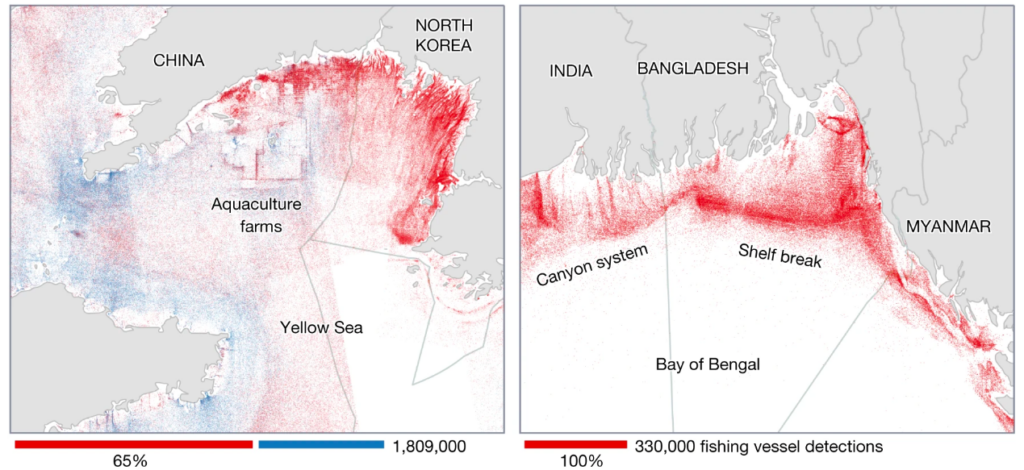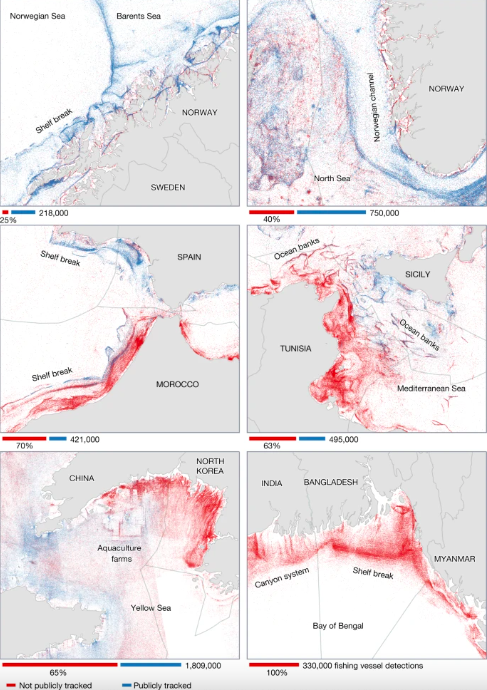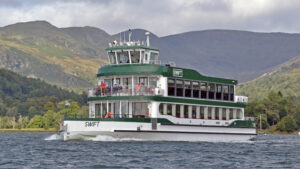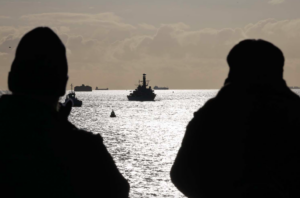‘Dark fleet’ of industrial fishing undetectable by authorities

A new study published in the scientific journal Nature has found that roughly 75 per cent of industrial fishing is currently undetectable by authorities. Researchers at Global Fishing Watch used high-tech radar data from the European Space Agency to observe all at-sea vessels during a five-year period from 2017 to 2021. This information was then compared to public vessel tracking data. Researchers used a model to predict which vessels were fishing, and from this identified a ‘dark fleet’.
There are more than 440,000 industrial fishing vessels around the world that are responsible for 72 per cent of the world’s ocean catch, says Oceana (an international advocacy organisation dedicated solely to ocean conservation). Unfortunately, it can often be difficult, if not impossible, to monitor their activities. That’s why the organisation partnered with SkyTruth, and Google, to create Global Fishing Watch, which allows anyone in the world to monitor and track the largest industrial fishing vessels in near-real time, for free. Today, around 80,000 vessels – about 20 per cent of the world’s industrial fishing fleet – can be tracked on the Global Fishing Watch map.
“Vessel tracking has come a long way in a short time, but there is still more to do,” says Andrew Sharpless, CEO of Oceana. “If you’re fishing on the ocean, you’re fishing on a public resource, and you should be required to prove that you are doing so legally. If the industrial fleets of the world knew they were being watched everywhere they went, all the time, by everyone in the world, they would break fewer laws. Governments must make sure their vessels are trackable so they can be held accountable.”
“Governments can’t manage what they can’t see,” says Jacqueline Savitz, chief policy officer at Oceana. “The type of deterrence created by cameras on our highways would be achieved on our oceans if governments would simply mandate that all vessels be publicly trackable. This is eminently achievable and urgent if we hope to maintain and improve fishery abundance. Fishing responsibly can increase the abundance and health of fish populations, but without transparency, illegal, unreported, and unregulated fishing will continue to undermine efforts to manage fisheries.”
Following the launch of Global Fishing Watch’s map, which provided the first global view of commercial fishing activity, Oceana and its allies have worked with many governments around the world to increase transparency of their commercial fishing fleets. For example, last July, the European Commission, the European Parliament, and the European Council agreed to a new law requiring all EU registered fishing vessels, including 49,000 small-scale vessels, to use tracking systems by 2030. The Philippines is also requiring all its commercial fishing vessels to install devices that track location, speed, and catch. Peru, Chile, and Belize have also made their national vessel tracking data publicly available on the Global Fishing Watch map.
In late 2023, the Spanish government investigated and sanctioned 25 Spanish-flagged vessels for infractions while fishing on the high seas. These fishing vessels were fined up to $65,000 (60,000 euros) for repeatedly turning off their public tracking devices on multiple occasions without cause, which is illegal for Spanish-flagged fishing vessels. The sanctioned vessels were apparently fishing near Argentinian waters between 2018 and 2021, according to Oceana analysis. Around 90 per cent of the Spanish-flagged vessels cited appeared to turn off their public tracking devices at least once, and Spanish-flagged vessels spent nearly twice as much time with AIS devices off as they did visibly fishing.
Main image, courtesy of Nature, shows excerpt from high-resolution mapping that reveals detailed patterns of fishing activity not publicly tracked. Full graphic below.











